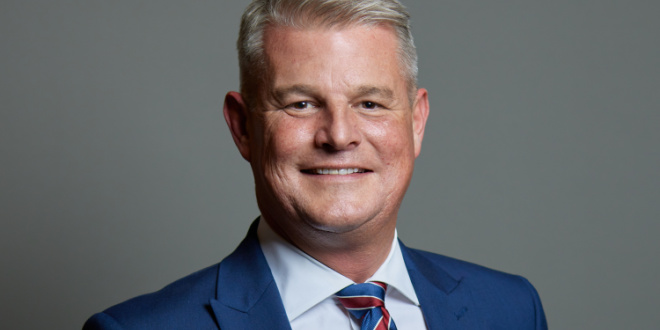The UK has fallen behind on research into gambling, Stuart Andrew, Gambling Minister, admitted to MPs this morning, as he reiterated the need for a ‘balanced and proportionate’ approach to emerge from the White Paper consultations.
These consultations, conducted by the UK Gambling Commission (UKGC) and DCMS, are seeking to pave the way for adoption of the Gambling Act review White Paper’s proposals. However, it seems that after two-and-a-half years in the pipeline, more evidence is still needed.
UK behind the curve on research
When appearing before MPs this morning, balance was also highlighted as a key objective. This balance, of course, concerns making sure checks and protections do not negatively impact customer experiences or the industry as a whole.
The Minister explained: “I think what we’re trying to do here is bring about a balanced and proportionate approach, which addresses many of the changes that have happened in the gambling scene over the last 20 years, but also seeks to bring about a uniform approach amongst operators to to have a process in place to identify those perhaps, who are entering the risk of gambling harm.”
Research played a key role in the more than two-year course of the Gambling Act review, culminating in April’s White Paper. The findings and scope of this research was high on the agenda for MPs this morning, such as widely publicised figures on gambling suicide.
The most notable piece of research into this put the number of gambling-related suicides at 117 and 496, a figure which one MP noted would account for “10% of all suicides across the UK.”
Reflecting on the difficult task of meeting with bereaved families, Andrew emphasised the need for greater research and understanding of this issue. Even the government, it seems, does not have the resources necessary to gain a full picture of this.
“I don’t think we as a government have actual definitive information that would say that X amount of suicides are a result of gambling harm,” Andrew remarked. “In some cases that will have been a cause, but there will potentially be other reasons as well.
“This goes back to the point that we need more research in this area to really understand this important piece of work. We want to have much better research and evidence to continue the approach we’ve already taken, which is evidence-led.”
RET levy – opportunity for ‘generational change’?
Earlier on in the session, UKGC CEO Andrew Rhodes shared his own view on the research matter, stating that the topic of gambling-related suicide has been ‘under-explored – but that delving further into this matter is a priority for the Commission.
The regulator aims to make exploring suicide a feature of its Gambling Survey of Great Britain, to clear up ‘an area that is very difficult to say definitively what the position is’, something that has been exacerbated by a reliance on corners reports.
In general, Andrew’s viewpoint was that as the UKGC and DCMS move ahead with consultations, more research is needed. Central to this objective is the White Paper’s recommendation for a research, education and treatment (RET) lev
“I think we’re probably behind the curve in terms of research,” he said. And I think that’s what this is why I think the introduction of the levy actually gives us a sort of generational change, if you like, in terms of the funding, and gives us an opportunity to have perhaps some of some of the best research in the in the world so that we can identify what are the issues that needs to be addressed in this area?
“And that’s what we’ve tried to do very much with this white paper, very heavy on evidence led on what data we have and what research we have available to us at the moment, to take that sensible approach.”
Is the Commission up to the task?
Also answering questions to MPs today was Tim Miller, the UKGC’s Executive Director of Policy and Research, and Sarah Gardner, the regulator’s Deputy Chief Executive.
Miller provided an update to parliamentarians on the progress and scheduling of the ongoing consultations. Having opened in July, the first round of consultations will cose on 18 October, followed by another series over the winter.
There are four focal areas of the first round – financial risk and vulnerability; game design, including building in greater player protection; improving consumer choice on direct marketing, particularly regarding cross selling; and strengthening age verification in venues.
Miller remarked: “The Secretary of State gave a very clear steer that she wanted to see the White Paper implemented at speed, and I think it’s fair to say that we were quick out of the box in getting that first set of consultations out there.”
However, the Commission has faced scrutiny in recent years, such as regarding its handling of the Football Index collapse as one example. For the assembled MPs, a key question was whether the regulator has enough resources to do its job.
In Rhodes’ view, yes – for now. The Chief Executive noted that the UKGC currently has a staff headcount of 351, meaning it is a small regulator compared to other national authorities, but is responsible for overseeing the world’s largest gambling industry.
The Commission has the resources necessary to effectively complete its consultations, he said. But if the added powers it is due to inherit from the White Paper are to materialise, so too will the funds.
“If we are going to do more complicated things around regulation that will require resources to do it,” Rhodes asserted. “I am comfortable with our current position, but in the longer-term we will need to invest more money and have more people with different skills.”
Research under review
Miller, meanwhile, also noted that the Commission’s research methods – tying in with the belief outlined by Andrew MP – will need an upgrade.
The Health Survey, for example, has been seen as the ‘gold standard’ of judging gambling-related harm, but the regulator is facing difficulties in this area due to a reliance on NHS data and the devolved nature of healthcare governance across the three nations of Great Britain.
Meanwhile, another development which has somewhat defined the UKGC’s public image over the past year is that of regulatory enforcement. The regulator broke records in 2022 and 2023 with the UK’s two largest penalties, served against Entain (£17m) and William Hill (£19.2m).
According to an unnamed source Rhodes referenced to MPs, nine out of 10 of the largest penalties were handed out and 85% of all the regulatory enforcement in the world is conducted by the UKGC.
“We are seeing less egregious cases, but we are not seeing none, we are not seeing their absence altogether,” he said.
Lastly, another area touched on by MPs was advertising, something which was dealt with little in the White Paper. Parliamentarians were therefore interested whether marketing – which was a huge talking point throughout the review – would be explored by the government in later cases.
In response, Andrew reiterated his major talking point – research. He said: “Again, once we have the research, if there’s more evidence that proves that advertising is causing harm, then we will look at that. The Secretary of State made that point. when we introduced the White Paper to the House, she was very clear on that.”
The assortment of responses to MPs questions shows a divergence of views. The UKGC appears confident that it can handle the consultations, but that it may need more funding further down the line.
Meanwhile, the government is not prepared to move ahead with any additional reforms post-White Paper adoption, in which it stands by the original mandate to deliver generational reforms and new terms of play for UK gambling.









